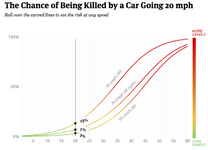Higher speeds (and older riders) mean more mortality. Distance only matters because of the higher speeds required.
View attachment 90652
Okay, point taken, but looking only at the traffic stats feels a bit reductive to me. There are other risks for mortality, and threats to quality of life that come with population density that are harder to measure, some related to transit directly, others related only tangentially.
It's sort of similar to what I call "The SSRI problem." SSRIs are considered to be very safe drugs, and if you're assessing safety solely by stats and literature, it's easy to buy into that narrative. The problem is that it's almost impossible to measure the suicidality and homicidality caused by SSRIs-- you just can't establish causality because we don't really understand the mechanism of action for this class of drugs (though we pretend that we do). But I think it's pretty clear to any clinician who has an open mind and who is paying attention that SSRIs are very dangerous, particularly to younger people, and particular when combined with alcohol and weed. Again and again, these are the patients who have a very specific flavor of suicidal and homicidal ideation that has a distinct signature-- you know it when you see it, but you can't pin a number to it.
Living and going to work in a high density environment can be really dangerous and dehumanizing in ways that offset the statistical safety-- and I say that as someone who loves both New York and Los Angeles. One of my worst depressive phases was in 1987, and I remember the lowest moment was when I was waiting for the subway one morning, wondering why I was the only one standing at the south end of the platform until I realized there was a homeless guy who'd just finished taking a crap five feet away from me, behind a post. Believe me, I had my own problems at the time that had nothing to do with the city, but for a moment there, I felt like jumping in front of the train.
What chart is going to measure that? And what about my buddy, who has a heart condition and a job that requires him to drive in L.A. traffic at or near rush hour on streets that are notorious for terrible, competitive drivers? He may not get killed in traffic, but he's seriously thinking of moving because the stress and air pollution could shorten his life. I'll miss him terribly if he goes, but it may really be the right play for him.
I think e-bikes address a huge quality-of-life issue that isn't always about practicality, getting to work and back or shopping for essentials. I'm at far lower risk for road rage, suicide, problems with law enforcement, and stress-related medical complaints than I was before I started exploring the hills on Survivor and Seeker.
I guess what I'm saying is, it would suck to die in a traffic accident, but e-bikes address the hard-to-measure risks that could not only shorten but also degrade quality of life. Yes, part of that does happen at over 35 MPH, and I like to go fast, but that doesn't require Class III and happens on only two hills once or twice a week with little traffic and no pedestrians.
I'm fine with a Class I bike, and Class I speeds on city streets, at least for now.



